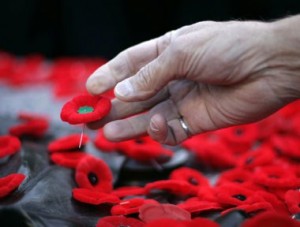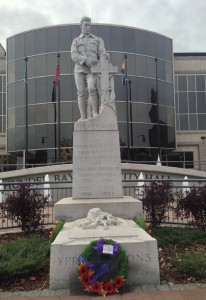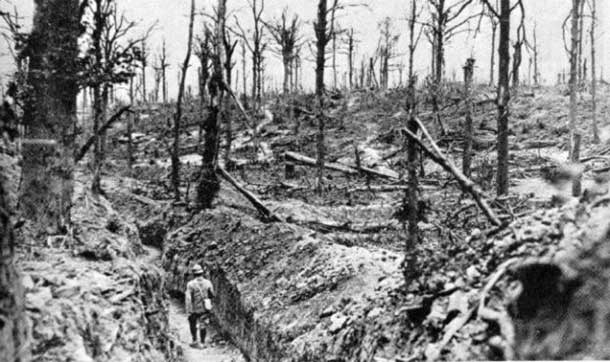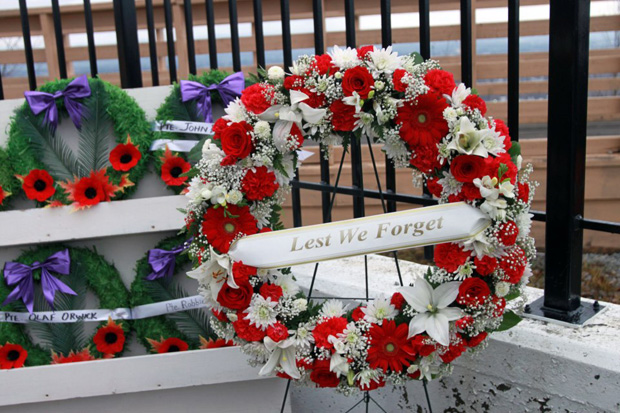 THUNDER BAY – LIVING – Francis Ledwidge hitched his life to the Allied Crusade of World War One. He was like so many thousands of others in the first waves of rallying round the flag battling an opponent across war torn Europe.
THUNDER BAY – LIVING – Francis Ledwidge hitched his life to the Allied Crusade of World War One. He was like so many thousands of others in the first waves of rallying round the flag battling an opponent across war torn Europe.
Just as a crimson poppy would become an eventual symbol of Armistice four years in the making, Ledwidge and his kind symbolized a kind of homespun bravery forged of verve and a redeeming stamina moulded into their onward, soldering souls. How raw they were enlisting.
Then, leaving the innocent domains and halcyon days where they grew up. They would immediately wade into, soon be marinated in, such horrific realms a round-the-clock bullets, bombs, canons and wailing cries of their transport horses pulling dread weights.
Frozen in time they were locked inside the dizzying whirling action where nocturnal shells, flying shrapnel, caught them—traumatized them– like young deer caught in the flame throwing headlights of battle. Author Helen Keller wrote, in 1916, ‘’all wars are the advancement of exploitation.’’
These armies of rookie enlistees came to know the severity of bloody warfare in the trenches. meant. It was an endless series of de-humanizing exercises: hand digging your sleeping shelters, and daylight stations, while simultaneously making meagre advancements against the Huns.

Life in the trenches meant existing in painfully straining elements. It was a surrealist scene p eering out from a trench viewing onto an embattled no man’s land. Puffs of smoke still wafting from the last Howitzer shells that baked the soil to blackness. Where gaunt trees stood. Tipped at angles akimbo wretchedly twisted into grotesque torques. As frugal, stark as an existential setting in Beckett’s play Waiting for Godot.
Their daylight experiences would live on, and on, in nightmare memories of the inferno they faced. ‘’for an eye could not follow it so as to see aught else than flames alone, even as a little cloud ascending upward.’’ Dante’s Divine Comedy: Inferno (14th Century) Intermixed with an eternal call of ‘’over the top… bayonets at the top’’ as they charged up-and-out of trenches bracing for hand to hand combat with their foe.
They’d try to find good footing on sloping, slippery, greasy trench walls. B efore reaching the top–a more level surface–then wildly running on an embittered terrain. How they ever reckoned to return alive simply amazes one. Yet, through a kind of Providential right-of-passage they would make it. Again. And, again once more. Again as cold rain pelted down. Or, as the sun baked them.
Casting long shadows as they ran flaring out of military formations just to finally reach a designated point.
Their meagre measures capturing an enemy trench enough to see a few grins on weathered faces. A chance to pause. Sharing a light and a cigarette with a comrade. An opportunity to have a private moment in shaving. Even a time to write a letter home.
Possibly a brief break, in the action, with enough time to catch a spray of stars overhead before darkness engulfed another chapter in war.
But this Great War was supposedly what men hoped, and prayed, would be the war to end all wars.
Not so. It became the first time where ‘weapons of mass destruction’ entered in.
It began with air born dispersals of chlorine gas sinister scientists auditioned sending brutal batches of the gas, across a front, attempting to exterminate columns of Allied troops.
Sir Ernest Shackelton on a British mission in the Southern Hemisphere, attempting to reach the South Pole in Antarctica, wept openly reading of man’s inhumanity to man when he came across a Times newspaper story. Months after the first facts of gas warfare were commonplace news in France and England. But Ledwidge was not only in the first missions of continental chaos in Europe he later sailed to the Dardanelles where the Turks had forged an ill-advised alliance with Germany.
At Gallipoli Ledwidge and what was known as the Anzacs, an entourage of Australian and New Zealand troops, along with a Western Canadian contingent, were all—ever–bracing time and again seeking a way to the summit of the hills while being pounded down by endless machine gun fire and rockets.
It was like being in Hades a New Zealander noted. In the blast furnace conditions in tempering the weather, ‘’We sucked on small stones to keep our mouths moist,’’ wrote the Kiwi.
It was a crippling story woven into the First War that became so maligned, so ill-timed. All Winston Churchill and his Australian commanders could do was eventually cede the region and accept a brutal defeat.
Peter Weir’s brilliant film, called Gallipoli, covering this devastating campaign is worth seeing. I saw it in New York City, at Carnegie Hall, in 1981 when it had its an American Opening.
The sold out crowd, in Manhattan, was so breathtakingly hushed in quietly exiting after the viewing. Though there’s a hollow-ness throughout Weir’s film especially understanding Gallipoli translates, in its origins, as ‘’a beautiful place.’’
Gallipoli is surely an agonizing document of how forces of good were subdued by the timing of events. Their situational layout. The bumbling of chief officers so tardy in sending supporting casts to those under a relentless siege. However, focusing on Ledwidge again. He returned, from Gallipoli, once more to the barricades of Europe.
A moment studying his life makes for what he was all about. As a writer of verses, in 1911, Francis Ledwidge—called Frank in Ireland as you will discover travelling there—saw his first book of poems published. A sterling achievement for one from far-off rural Ireland who, where he grew up, either walked or arrived on a bicycle shuffling between youthful jobs in various hamlets he adored working in. In one case Ledwidge walked 30 miles home from a job.
But Ledwidge’s poems and his Songs of the Fields book carries rhymes, and images, about his lilting green hilled homeland and often birds.
Their melodies were music that put Ledwidge in awe of the forces of Nature. Like the old Scottish tune of 1900 that later became an English hymn with its recognizable chorus of: ‘’Morning has broken, Blackbird has spoken…”
Ledwidge would portray the image of blackbirds, and blue herons, into his poetic-storytelling then animate his verses with the timeless overhead calls of birds. Ironically, in 1916, while a new book of poems by Ledwidge had been published and somehow (?) reached him on the front line, Ledwidge with his brigade had short moments to celebrate with a few readings aloud before being told of the passing of a fellow Irishman.
Ledwidge penned what became a classic memoriam. It’s a curious era as Dr. John McCrae, of McGill University in Montreal, was there at Ypres as well. McCrae having done an earlier medical tour in the Boer War of South Africa.
Likely McCrae composed his Flanders Fields in the same year.
Same regions of the war. Ledwidge wrote this for McDonnaugh, his friend, killed in action:
‘’He will not hear the bittern cry In the wild sky.
Now, where he is lain.
Nor voices of other sweeter birds
Flying well above… In the wailing sky.”
I thought of them over this past weekend while stacking birch firewood inside the old concrete blocks and cement flooring of our former well house. I wore a cherished green army coat very thermal in autumn. Though my proletariat task was something any legionnaire of the Great War would envy inside a sunny bubble of fall’s glowing sunlight. Before long there was an optimistic note from a train way off to the south. Besides songbirds alighting on branches of tamarack and spruce. When I reached in a pocket for a mandarin orange surprisingly I found a $10 bill with its amethyst toned purplish tribute to Remembrance day etched, so deftly, by a Canadian artist. Peeling the orange geese sounding beyond a tree line—well before being seeing them– flying high above. Heading elsewhere.
Some of the Celtic First World War writers would be called the Wild Geese of Ireland. Ledwidge would have adored these moments. Beyond his meanderings and sea travels across the Mediterranean, Atlantic and Irish Sea, Ledwidge was involved in a rather peaceful assignment rebuilding a road in Flanders when he was fatally wounded by a blast. He landed face up with his mouth open wrote a fellow soldier. It was as if he still had a song to sing for us. Indeed Ledwidge’s posthumous book was called Song of The Fields. And, It always reminds me of inquiring, back in time, at London’s Slade College of Art looking at the portfolio archives of its former students. ‘’What happened to ones like Spenser or Anderson?’’ “They died on the battlefields of the Great War. In either Gallipoli or Europe,’’ was the Librarian’s melancholy reply. In the autumn of 1918 a fellow war poet called Wilfred Owen was writing an incredibly beautiful letter to his mother back home. Owen’s lines were so devoid of the conditions when reflecting on the abominations in the trenches. The ghastly wounded with them.The slimy masses of rodents.
The freeze-thawing slurry of clay pack, stony breccia, dirt, and, scree. All about. Everywhere one stepped. Owen sounded absolutely affirmative. Looking forward at last to sailing home—soon—the last footnotes of these battles to finally cease. A surrendering dreamed of to come. He said to her in his letter, ‘’I hope you are warm as I am, mother, in your room You could not be visited by a band of friends half so fine as surround me here. There is no danger down here or if any (at the moment). It will be well over before you read these lines.’’
With merely a week to go before the Great War ended Owen was pulling gear, with his mates, crossing a canal at Ors in Northern France when he perished as well. Beneath a barrage of fire. Sadly, regrettably, his mother received Wilfred’s letter on the day of that first Declaration of Armistice Day trumpeted around the world for an end to all the devastation and suffering. Now, attending this year’s Armistice at cenotaphs where ever you go to honour our graces of PEACE from the 11th month, the 11th day at the 11th hour of that victorious ending in 1918 may the ancient song of Isaac Watts triumphantly echo across our Dominion. Taken in chorus singing by those gathering at common assemblies outdoors.
Or, in a church. Or, an indoor rink. While others huddle by radio or a television, may Watts’ lyrics carry all the inspiration it must have taken him in first drafting his hymn: : Our God, our help in ages past Be Thou our shelter from the stormy blast. Like flowery fields the nations stand Pleased with the morning light; The flowers ‘neath the mower’s hand (Will) lie withering ere ‘tis night.
O, God, our help in ages past, Be Thou our shelter from the stormy blast… And, our Eternal home!
Ronn Hartviksen







